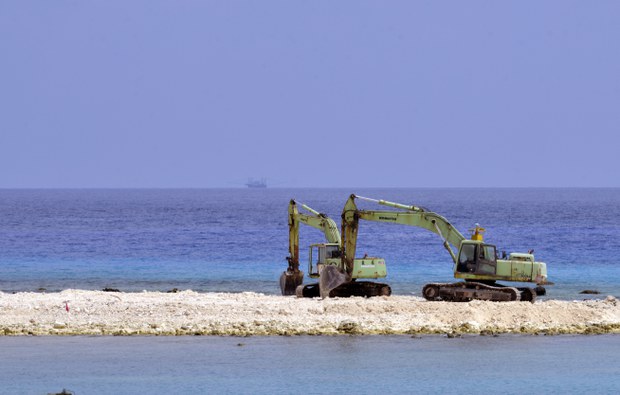Report on Chinese construction in Spratlys challenged in Philippines, internationally
Share

Two excavators are set up at a construction site on Taiping island in the Spratly chain in the South China Sea, March 23, 2016.
Experts are disputing a media report that China is developing disputed and unoccupied land features in the South China Sea.
The Philippines voiced serious concern about the news in the Bloomberg News article, which cited unnamed Western officials for its report about China “building up several unoccupied land features” in the Spratly Islands.
But a Philippine military source told BenarNews there were no signs of construction in the four territories within the chain. Beijing, for its part, rejected the report.
In its article published on Tuesday, Bloomberg reported on what it called China’s building spree in unoccupied reefs in the Spratlys, and added that reclamation activities took place at four sites: Eldad Reef in the northern Spratlys, Lankiam Cay, Whitsun Reef and Sandy Cay. The Spratly Islands are claimed by China, the Philippines, Vietnam and Taiwan.
The Philippine Department of Foreign Affairs was quick to respond.
“We are seriously concerned as such activities contravene the Declaration of Conduct on the South China Sea’s undertaking on self-restraint and the 2016 Arbitral Award,” the department said in a statement on Tuesday night.
In 2016, an arbitral tribunal ruled in favor of Manila and threw out China’s vast claims to the sea region, a ruling that Beijing has rejected.
Bloomberg came out with the report as the United States pledged to back the Philippines over “the reported escalating swarms” of Chinese ships encroaching on Manila’s territories in the contested waterway.
Next month, Philippine leader Ferdinand Marcos Jr. is to meet with his Chinese counterpart, Xi Jinping, during his first presidential visit to China.
Report challenged
The South China Sea Probing Initiative, a state-supported Chinese think-tank, issued a tweet questioning the report’s findings.
“So far, of the four reefs accused, no signs of land reclamation on Lankiam Cay, Eldad Reef and Whitsun Reef, Sandy Cay is indeed in reclaiming, however it is conducted by Vietnam. The reporter of Bloomberg News should do more homework on SCS issue,” it tweeted.
During a press briefing in Beijing on Wednesday, a spokeswoman for the Chinese Ministry of Foreign Affairs rejected Bloomberg’s report as “completely untrue.”
“Refraining from action on the presently uninhabited islands and reefs of the Nansha Islands is a serious common understanding reached by China and ASEAN countries in the Declaration on the Conduct of Parties in the South China Sea (DOC), and China always strictly abides by it,” Mao Ning said in response to a reporter’s question. China refers to the Spratlys as the Nansha islands.
The Philippine military had little to say about the report officially, pending verification.
“The instruction is that the authority [to issue a statement] should come from the National Task Force for the West Philippine Sea,” said Col. Isagani Nato, acting spokesman of the military’s Western Command, based on Palawan island.
The West Philippine Sea is the name that Manila uses for the territories it claims in the South China Sea. Philippine troops have occupied Lankiam Cay (also known as Panata island), a 108-acre cay, since 1978.
A military official, speaking on condition of anonymity, said there were no monitored Chinese reclamations in the areas listed in the Bloomberg report.
“Based on our patrols, we have not noticed (Chinese reclamations),” said the source official who requested anonymity because she was not authorized to speak to reporters on the matter, adding “they did not indicate construction.”
The Asia Maritime Transparency Initiative (AMTI), attached to the Washington-based Center for Strategic and International Studies, gave a similar assessment.
“China has not occupied a new feature since December 1994 and has not built up anything it didn’t already occupy,” AMTI Director Greg Poling said, adding “commercial imagery cannot corroborate” Bloomberg’s claims.
Another analyst, Taylor Fravel at the Massachusetts Institute of Technology, pointed out that landforms appear and disappear in the South China Sea.
Jeoffrey Maitem in Davao City, Philippines, contributed to this report.
BenarNews is an RFA-affiliated news service.







